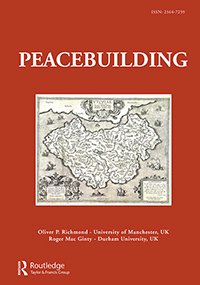By Ingri Bøe Buer
This article reconsiders peace and security from the perspectives of community leaders, educators and activists in favelas in Rio de Janeiro, Brazil, in 2019–2020. Through a critical lens, it argues that the urban violence in Rio de Janeiro resembles a form of new wars where the state is a major producer of insecurity. It questions the meaning of peace and top-down pacification processes in a city where the favelas, since their origin, have been considered dangerous areas needing to be pacified and controlled. The article introduces favela peace formation as a concept to describe alternative processes working to reduce the inter-sectional forms of violence in these communities: non-violent, locally legitimate peace processes working to slowly construct a positive, sustainable peace. To conclude, it discusses how favela peace formation presents a way of imagining peace as ‘care’ instead of ‘order’ in response to the state’s violent peace as ‘control’
Peacebuilding, DOI: 10.1080/21647259.2024.2354083




